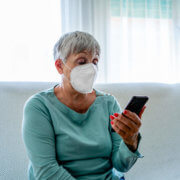Using Telemedicine to Treat Seniors’ Mental Health
The pandemic is causing people to feel more stressed, grief, anxiety, and worry. According to the Centers for Disease Control and Prevention, these are very natural responses to this difficult situation. While there are ways to manage these negative emotions, not everyone is equipped to handle them effectively. There are times when getting professional help is the best course of action. And the elderly are particularly vulnerable to both the virus and the bouts of mental health.
The effects of COVID-19 on mental health
For seniors, there has been a lot of fear and anxiety during the COVID-19 crisis. This is the age group that’s been hit the worst – they’re getting the sickest and they comprise a sizeable percentage of those who passed away from the virus.
It’s especially difficult for seniors to maintain relationships and links to people outside of their homes. Most socializing now occurs online, so they’re at an obvious disadvantage. Most of them aren’t technologically savvy. A recent study found that the pandemic has taken a severe toll on seniors’ mental health. Due to social distancing measures and stay-at-home protocols, 17% of seniors 65 and older feel isolated, while 26% have higher risks of early death due to loneliness.
Moreover, the pandemic’s mental health impacts have even stretched to family caregivers who look after seniors. Caregivers carry the psychological burden of keeping their senior loved ones healthy and safe, even before the pandemic. Add in the stress and anxiety over contracting the virus, possible financial struggles, and the inability to access much-needed health services, caregiving is proving to be a much harder task than it already was to start with.
How telemedicine helps
Telemedicine gives seniors access to mental health professionals, easing the strain on both the seniors’ and caregivers’ mental stress. However, while telehealth does connect more senior patients to psychiatrists, there’s still a shortage of these specialists to contend with. Fortunately, telehealth gives patients the option to obtain care from different types of mental health professionals, such as mental health nurses.
Plus, telehealth also gave rise to the widespread adoption of online healthcare learning. This strategy helps produce more graduates, addressing the shortages in specialized care. Nowadays, nurses can take online RN to BSN programs to upskill and advance their careers. Through these programs, nurses can earn specializations in sought-after tracks including mental health nursing. The Commission on Collegiate Nursing Education deems these online programs just as valid as traditional ones. This makes them great options for practicing nurses who want to advance their careers without taking time away from work due to the lessons being taught purely online. As these mental health nurses are trained specifically in psychotherapy and psychopharmacology, they’re fully equipped to handle telemedicine sessions for mental health. Telemedicine opens up lines of communication to alternative mental health professionals like these advanced-practice nurses.
Guiding seniors through telemedicine sessions
Caregivers are responsible for helping seniors through the telemedicine process. While the virtual calls can be set up by caregivers, seniors who can perform the task for themselves should be encouraged to do so. But when explaining technology to them, it’s important to break down the process step-by-step using simple language.
Start with explaining the value of mental health telemedicine before walking them through a practice session. It would also benefit seniors to have written instructions clearly outlined. After running through a session, have them repeat the process until they get comfortable with it. Remember to be patient and give them encouragement. Even care teams are struggling with the transition to telemedicine, so it’s even tougher for the senior demographic. They have to learn new technologies on top of adjusting to a new medium of care.
The pandemic may have exacerbated mental health issues in the elderly and their caregivers, but it also made telemedicine more commonplace. Having this type of access to much-needed mental health assistance could make all the difference between suffering mental distress and thriving.
Photo credit: Pexels.com









